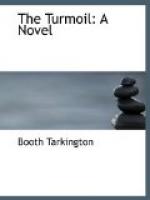It was Narcissism in him to love the city so well; he saw his reflection in it; and, like it, he was grimy, big, careless, rich, strong, and unquenchably optimistic. From the deepest of his inside all the way out he believed it was the finest city in the world. “Finest” was his word. He thought of it as his city as he thought of his family as his family; and just as profoundly believed his city to be the finest city in the world, so did he believe his family to be—in spite of his son Bibbs—the finest family in the world. As a matter of fact, he knew nothing worth knowing about either.
Bibbs Sheridan was a musing sort of boy, poor in health, and considered the failure—the “odd one”—of the family. Born during that most dangerous and anxious of the early years, when the mother fretted and the father took his chance, he was an ill-nourished baby, and grew meagerly, only lengthwise, through a feeble childhood. At his christening he was committed for life to “Bibbs” mainly through lack of imagination on his mother’s part, for though it was her maiden name, she had no strong affection for it; but it was “her turn” to name the baby, and, as she explained later, she “couldn’t think of anything else she liked at all!” She offered this explanation one day when the sickly boy was nine and after a long fit of brooding had demanded some reason for his name’s being Bibbs. He requested then with unwonted vehemence to be allowed to exchange names with his older brother, Roscoe Conkling Sheridan, or with the oldest, James Sheridan, Junior, and upon being refused went down into the cellar and remained there the rest of that day. And the cook, descending toward dusk, reported that he had vanished; but a search revealed that he was in the coal-pile, completely covered and still burrowing. Removed by force and carried upstairs, he maintained a cryptic demeanor, refusing to utter a syllable of explanation, even under the lash. This obvious thing was wholly a mystery to both parents; the mother was nonplussed, failed to trace and connect; and the father regarded his son as a stubborn and mysterious fool, an impression not effaced as the years went by.
At twenty-two, Bibbs was physically no more than the outer scaffolding of a man, waiting for the building to begin inside—a long-shanked, long-faced, rickety youth, sallow and hollow and haggard, dark-haired and dark-eyed, with a peculiar expression of countenance; indeed, at first sight of Bibbs Sheridan a stranger might well be solicitous, for he seemed upon the point of tears. But to a slightly longer gaze, not grief, but mirth, was revealed as his emotion; while a more searching scrutiny was proportionately more puzzling—he seemed about to burst out crying or to burst out laughing, one or the other, inevitably, but it was impossible to decide which. And Bibbs never, on any occasion of his life, either laughed aloud or wept.
He was a “disappointment” to his father. At least that was the parent’s word—a confirmed and established word after his first attempt to make a “business man” of the boy. He sent Bibbs to “begin at the bottom and learn from the ground up” in the machine-shop of the Sheridan Automatic Pump Works, and at the end of six months the family physician sent Bibbs to begin at the bottom and learn from the ground up in a sanitarium.




